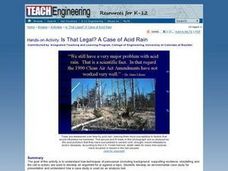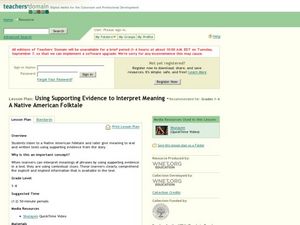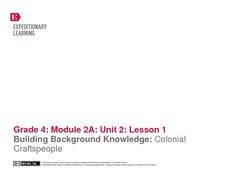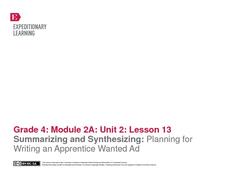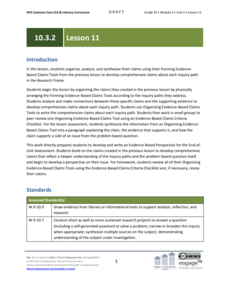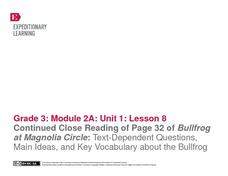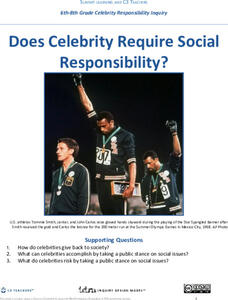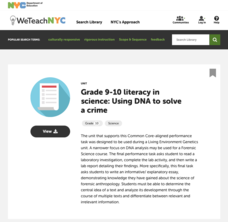Curated OER
Reformers versus Residents in Five Points: A Role Play
Social Studies and role-playing can go hand in hand. Learners use supporting evidence found in primary and secondary source material to develop a character from the Five Points neighborhood in the 1850s. Each student takes on the role of...
Curated OER
Is That Legal? A Case of Acid Rain
Develop an environmental case study! Elementary learners discover how a case study is used as an analysis tool. The goal of this activity is to show pupils how techniques of persuasion (including background, supporting evidence,...
Curated OER
Using Supporting Evidence to Interpret Meaning-A Native American Folktale
Students read Native American folktales. In this multicultural literature instructional activity, students research the style of writing used in Native American folktales. They view a video of a folktale, and discuss the...
EngageNY
Science Talk: How do Bullfrogs Survive
Following the reading of the book Bullfrog at Magnolia Circle, the ninth activity in this unit involves emerging experts in a science talk about how bullfrogs survive. Looking back through the text, young scholars prepare for the...
EngageNY
Building Background Knowledge: Colonial Craftspeople
In the first lesson plan of this unit on colonial trade, fourth graders gain background knowledge of different jobs performed by early colonists. The class begins with a slide show presentation that includes a variety of great...
EngageNY
Summarizing and Synthesizing: Planning for Writing an Apprentice Wanted Ad
In instructional activity 13 of this unit on colonial trade, young researchers learn about apprentices as they prepare to write help-wanted ads for the specific trade they have been researching. To begin, the class listens closely as the...
Curated OER
Is That a Fact?
Investigate popular scientific claims and gather evidence to defend or argue against an author's stance. Writers synthesize information and compose their own "Really?" columns modeled after those found in the weekly "Science Times"...
EngageNY
Continued Close Reading of Bullfrog at Magnolia Circle: Text-Dependent Questions and Vivid Words and Phrases
As 3rd graders continue reading Bullfrog at Magnolia Circle, they focus on the concepts of predator and prey in the fifth lesson plan of this unit. Scholars further develop their ability to answer questions using evidence from the text...
EngageNY
Continued Close Reading of Bullfrog at Magnolia Circle: Text-Dependent Questions and Vivid Words and Phrases
In the third activity from this unit based on the book Bullfrog at Magnolia Circle, learners focus on using specific details from the text-to-answer questions about the habitat of bullfrogs. While reading the text, young...
Polk Bros Foundation
Answer the BIG Question with Cited Examples and Evidence
Close up your unit of study with an examination of one of the guiding or essential questions as it relates to what your class has studied and other research. Class members first write down the question. Then they note down information...
National Woman's History Museum
Creating a Historical Thesis Statement
A strong thesis statement not only identifies the subject of an essay but also presents a claim that must be supported with evidence. After researching how nursing has evolved in the United States since the Colonial era, young writers...
EngageNY
Grade 10 ELA Module 3: Unit 2, Lesson 11
It's time to prove it! Scholars now must ensure that all claims are based on evidence. Learners write detailed claims for each inquiry path using several evidence-based claims tools. At the end of the lesson plan, pupils respond to a...
EngageNY
Grade 10 ELA Module 3: Unit 2, Lesson 5
Have you ever argued for the sake of argument? Scholars dig into what makes a compelling argument. They learn to create evidence-based arguments using a teacher-led model. Once finished, they use an evidence-based checklist to guide...
Curated OER
Because of Winn-Dixie Scrapbook
Here is a fun resource that your kids will love. While reading the book Because of Winn-Dixie, they analyze the story's main characters by creating an online scrapbook. The purpose is to have them identify character traits and use...
EngageNY
Grade 12 ELA Module 3
Gun, Germs, and Steel by Jared Diamond is a seminal work of historical nonfiction from the late 20th century. Use the author's claims and supporting evidence to guide your high school seniors through their research project, culminating...
Howard Hughes Medical Institute
Human Impacts on Biodiversity
Have you always wanted to take your science class on an amazing field trip they will never forget? Now you can! Observe the wildlife in an African savanna through trail cameras with a five-part data analysis activity. Learners analyze...
University of North Carolina
Communication Studies
A degree in communications incorporates disciplines such as business, law, and media as well. A writing handout offers prospective communications majors information about what kind of assignments to expect in a typical course....
EngageNY
Close Reading of Bullfrog at Magnolia Circle: Text-Dependent Questions, Main Ideas, and Key Vocabulary about the Bullfrog
As your 3rd grade class finishes reading Bullfrog at Magnolia Circle, the eighth lesson plan of this unit helps readers from an understanding of the very specific information on the final page of the book. As with the entire unit,...
C3 Teachers
African American Voices and Reconstruction: What Does It Take To Secure Equality?
High schoolers research the 13th, 14th, and 15th Amendments, as well as other primary source documents, to determine Reconstruction's impact on the North and South. The 34-page inquiry-based lesson includes a staging question and...
C3 Teachers
Women’s Rights: What Does It Mean to Be Equal?
A guided-inquiry lesson asks seventh graders to research the compelling question, "What does it mean to be equal?" Guided by three supporting questions, researchers complete three formative performance tasks and gather evidence from...
C3 Teachers
Celebrity Social Responsibility: Does Celebrity Require Social Responsibility?
Is much required of those to whom much is given? That's the central question asked of middle schoolers in this lesson. Scholars consider the actions of Tommie Smith and John Carlos, Colin Kaepernick, Lady Gaga, and others who have taken...
C3 Teachers
Black Women Writers: What Gets Black Women Heard?
Zora Neal Hurston, Toni Morrison, and Maya Angelou are featured in a guided inquiry unit. High schoolers research the lives and works of these and other Black women writers and craft an argument, using evidence from their research, to...
New York City Department of Education
Grade 9-10 Literacy in Science: Using DNA to Solve a Crime
Scholars become detectives and use science to solve a crime! A complete unit introduces DNA and includes hands-on activities that have learners model DNA and extract it from different food types. A culminating activity challenges...
Curated OER
Let's Get it Together! Reading to Learn
Let’s learn about frogs! Young readers are led through “Freaky Frogs,” a non-fiction article. Teach learners how to edit an article so there are fewer details to sift through. After talking through the article, they learn the six steps...

